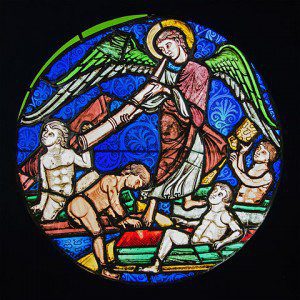 Everyone should have a worldview. What’s that? It’s having an opinion about reality. It’s answering questions that science and religion grapple with, such as: How did the universe originate? How did I get here? What is my purpose in living? Where am I going? Without a worldview, we’re like a ship without a rudder, an airplane without wings, a car with no wheels. We don’t know what’s up or what’s happening.
Everyone should have a worldview. What’s that? It’s having an opinion about reality. It’s answering questions that science and religion grapple with, such as: How did the universe originate? How did I get here? What is my purpose in living? Where am I going? Without a worldview, we’re like a ship without a rudder, an airplane without wings, a car with no wheels. We don’t know what’s up or what’s happening.
One of the things that makes Christianity stand out concerning truth claims is its awesome worldview about the future. Now, all Christians don’t have the same details in their eschatological (“last things”) worldview. But there are at least four basic fundamentals that most Christians and even orthodox Jews embrace in their worldview about the future. They are predicated on the concept found repeatedly in the Jewish Bible (Old Testament) called “the day of YHWH” (YHWH=the name of the God of the Bible) or simply “the/that day.” It is a future day when God will rise up from his throne in heaven in mighty anger and intervene in the affairs of humankind like never before by bringing world history to an end as we know it.
When that eschatological day of YHWH comes, then will occur the four fundamental events in the following chronological order: (1) the coming of the Messiah of Israel in glory, which Christians call “the second coming of Christ,” (2) the resurrection of the righteous dead, (3) the judgment, and (4) the consummation of God’s kingdom in all its glory. When you compare the several scriptures in the biblical books of Daniel and Revelation that mention 1,260 days, forty-two months, three and a half years, and finally the 1,290 days and 1,335 days in Daniel 12.11-13, I think all four of these events will occur in less than a three month span.
The great hope of Christianity, which is also shared by Orthodox Judaism as well as Islam, is the future resurrection of the righteous dead. When that happens, it will be a great victory over humankind’s worst enemy–death. The Apostle Paul wrote about it, saying, “For this we declare to you by the word of the Lord [Jesus], that we who are alive, who are left until the coming of the Lord [Jesus], will by no means preceded those who have died. For the Lord [Jesus] himself, with a cry of command, with the archagnel’s call and with the sound of God’s trumpet, will descend from heaven, and the dead in Christ will rise first. Then we who are alive, who are left, will be caught up in the clouds together with them to meet the Lord [Jesus] in the air; and so we will be with the Lord forever” (1 Thessalonians 4.15-17; NRSV throughout unless otherwise noted). But what does Paul mean in saying, “by the word of the Lord”? He means something Jesus had taught.
Jesus taught Martha something about the future resurrection, and to affirm his conviction he then raised her brother Lazarus from the dead. This significant episode no doubt was prominent in the oral Jesus’ traditions that preexisted the Apostle Paul’s conversion, so that Paul knew of it. Jesus told Martha, “‘Your brother will rise again.’ Martha said to him, ‘I know that he will rise again in the resurrection on the last day [=that/the day]. Jesus said to her, ‘I am the resurrection and the life. Those who believe in me, even though they die, will live, and everyone who lives and believes in me will never die'” (John 11.23-26).
Paul’s words, “the dead in Christ will rise first,” allude to Jesus’ words about those believers who “die, will live.” And Paul’s words about those believers “who are alive, who are left,” at Christ’s coming allude to Jesus’ words, “everyone who lives and believes in me will never die.”
The next of the four fundamental events of the eschaton will be the coming of Israel’s Messiah, whom Christians believe will be Jesus. Paul says, as quoted above, that Jesus will “decend from heaven” to meet his resurrected and translated people “in the air.” Jesus had explained that at this time “he will send out his angels with a loud trumpet, and they will gather his elect from the four winds, from one end of heaven to the other” (Matt. 24.31). That is, those raised will be all over the globe, and the angels will gather them together in the air. Jesus’ disciples asked, “‘Where, Lord?’ He said to them, ‘where the corpse is, there the vultures will gather'” (Luke 17.32; cf. Matt. 24.28). The “corpse” refers to the many dead Jews lying in Jerusalem.
Recall that I said all of these four fundamental events of eschatology will be set in motion when God raises up from his throne in heaven in mighty anger. Isaiah the Prophet captures the moment most vividly by declaring, “The LORD [YHWH] goes forth like a soldier, like a warrior he stirs up his fury; he cries out, he shouts aloud, he shows himself mighty against his foes. [Now the speaker shifts from Isaiah himself to Isaiah speaking on behalf of the LORD.] For a long time I have held my peace, I have kept still and restrained myself; now I will cry out like a woman in labor, I will gasp and pant. I will lay waste mountains and hills,” etc. (Isaiah 42.13-15).
Why will God be so angry? It is because the greatest tyrant the world has ever seen will be destroying his people on earth, first genuine Christians (apparently) by the billions and then Jews at the very end. Christans call hiim Antichrist, Orthodox Jews call him Armilus, and Muslims call him Dajjal. He will in those last days marshall the nations’ armies to the land of Israel to wipe that nation off the map.
The Bible is full of prophecies about this. It will be at the end of that period of time mentioned above that will last 3.5 years, which Jesus called “the (great) tribulation” (e.g., Matt. 24.21; cf. Revelation 7.14). At the end of this time period God will come to aid of his people by sending his agent Jesus of Nazareth to earth as a mighty warrior-king to deliver the surviving, penitent, Jewish people and destroy this Antichrist and his numerous, militant hordes.
This war is called “the battle on the great day of God the Almighty” (Revelation 16.14). Some Christian Bible scholars rightly call it the Messianic Destruction since the LORD will fight by means of Messiah Jesus who will lead Jewish men in destroying their enemies (e.g., Zechariah 12.3-9; 14.3-7; Revelation 19.11-16).
But what will happen to Jesus’ people who will meet him in the air on his way from heaven to earth to fight this battle? In other words, Where do those righteous ones go right after the resurrection? Most Christians have been a bit fuzzy on the details at this point in this biblical, eschatologial scenario. Many of them have not believed that the peace-loving Jesus–who said “love your enemies” and “turn the other cheek”–can be a warrior-king at all. But that is not the case with Orthodox Jews about their Messiah. They believe this scenario about Jews being subjected to a great holocaust at the end of days and their Messiah coming as a warrior-king to deliver them. They call it the Redemption of Israel. Will Jesus have turned into another person of whom we Christians do not know?
Not at all. It’s all about timing. It’s all about conditions on earth. Wise King Solomon wrote, “For everything there is a season, and a time for every matter under heaven; . . . a time to kill, and a time to heal; . . . a time to love, and a time to hate; a time for war, and a time for peace” (Ecclesiastes 3.2, 8). The God of heaven and earth deems this time a time for war.
So, will Jesus’ people who meet him in the air descend with Jesus to earth? Will they participate with him in this mother of all battles? I don’t think so. There is nothing in the Bible that indicates this. Accordingly, posttribulationist Christians, in their effort to refute pretribulationism (=rapture of saints to heaven prior to the tribution) err in claiming the elect who meet Jesus in the air will accompany him in his descent to earth.
Something else that happens at the time of the second coming of Christ is that God is going to make “a new heaven and a new earth” (Revelation 21.1). I think “heaven,” here, refers to “the heavens” as in Isaiah 65.17 and 66.22, meaning the entire universe other than the earth. At that time “the holy city, the new Jerusalem,” will be “coming down out of heaven from God” (Revelation 21.2). It had been God’s abode with his angels in heaven. At the Last Supper Jesus said of it to his disciples, “In my Father’s house are many rooms; . . . I am going there to prepare a place for you” (John 13.2 NIV). I think Isaiah refers to it, and the union of Christ and his people in air, by him saying, “Go, my people, enter your rooms and shut the doors behind you; hide yourselves for a little while until his [YHWH’s] wrath has passed by. See, the LORD is coming out of his dwelling to punish the people of the earth for their sins” (Isaiah 26.20 NIV). This interpretation is strongly supported by the fact that the previous verse is one of the two or three most vivid resurrection texts in the Jewish Bible. It says, “But your dead will live; their bodies will rise. . . . the earth will give birth to her dead” (v. 19 NIV).
So, the righteous who are raised at the resurrection will not continue with their Lord Jesus in his descent to earth to fight the Antichrist and his armies. Rather, they will enter into their eternal home, it seems to watch the victorious outcome of the battle below that Jesus, now a warrior-king, will achieve. After that God will conduct the judgment, again by means of his agent Jesus. At this time justice will prevail, the righteous will be rewarded, and evildoers will be punished. When this judgment ends in a matter of days, there will be great rejoicing thereafter in the peaceful kingdom of God and Christ that will be worldwide and endure forever.

















